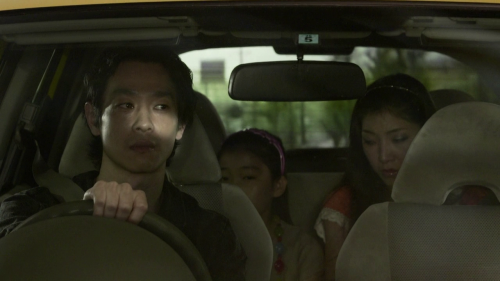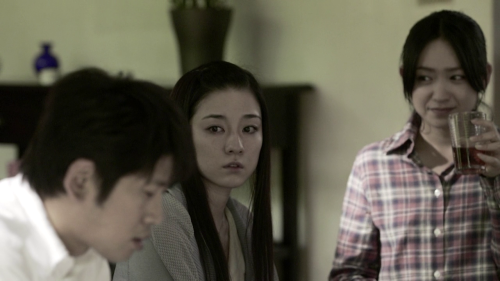“If it cannot break out of its shell, the chick will die without ever being born. We are the chick-The world is our egg. If we don’t crack the world’s shell, we will die without ever truly being born. Smash the world’s shell. FOR THE REVOLUTION OF THE WORLD!”
–Revolutionary Girl Utena
Shokuzai (Penance) is a story of people dying without ever being born. Exposed to a tragedy at a young age, it’s like they were frozen in time and encased within a shell of adolescence as they grew into adulthood. They were five girls in their school’s playground when one of them was abducted right in front of their eyes and murdered. 15 years later, we return to their lives and find them still struggling to come to terms with what happened. Stunted, empty, cursed; they could never break out of their shells. Thus began the 5 episode series Shokuzai, a 2012 Japanese TV drama directed by the horror maestro Kiyoshi Kurosawa (Cure, Pulse, Tokyo Sonata.)
When I began investigating Japanese film in 2008, Kurosawa fast became a favourite of mine. Like a Japanese Tarkovsky, his style is calm and atmospheric, using background noise and image to convey a strong feeling of alienation and disquiet. If you’ve ever seen anything from the anime directors Ryutaro Nakamura (Serial Experiments Lain, Ghost Hound) or Hiroshi Hamasaki (Texhnolyze, Shigurui,) you’ll know what to expect. Kurosawa’s made a lot of horror, but in a genre renowned for its visceral qualities, his films are unusually meditative and artful nightmares that play with the strange and surreal to emphasise an ugly and desperate reality. When even Martin Scorsese is a fan (the excellent Shutter Island owes a lot to Kurosawa,) you realise this is a filmmaker worthy of note.
Anyway, back to Shokuzai. I’m writing about it with Mira of Hachimitsu (episodes one and two) because we just wanted to spread the word (and I needed an excuse to write about Kurosawa anyway!) There’s a misconception out there, particularly amongst anime fans, that Japanese live-action is somehow not worth the time because “the Death Note movies weren’t any good.” To that I say, rubbish! Like with any medium, there’s good and bad, but some of my favourite films are Japanese. Shokuzai is a TV series, but if you’re into the likes of Game of Thrones, there’s really no excuse not to give this a shot. Rant aside, then, episodes three and four are what I’m supposed to be writing about.

Episode three may well be the series’ best, and certainly most difficult. Shokuzai has a latticework-like structure, where each instalment focuses on one of the affected girls 15 years after the event. This time it’s the turn of Akiko Takano, a NEET woman still living at home, browbeaten by an overbearing mother who’s more concerned with the shame of being a “lower class” family than the welfare of her own child. Into all this comes Akiko’s older brother, Koji, back from Tokyo with a new wife and step-daughter in-tow. This is when things start to get more than a little weird and wrong.
Akiko is in love with Koji, but the more he ingratiates himself back into her life, the stranger a man he seems. It turns out that he’s a paedophile. At one point, his frightened step-daughter runs to Akiko crying for help, but she does nothing. She knows what Koji’s up to, but doesn’t seem capable of facing reality. In the end, she saves the girl by killing him, but far from being the moral choice on her part, one is left to wonder if she did it because he didn’t return her love.

The fourth episode is less affective, but similarly delivers a distorted world-view. Yuka Ogawa has grown into an attention-craving, petty temptress more concerned with besting her little sister, Mayu, than anything else and starts an affair with Mayu’s newly-wed husband just because she’s convinced that Mayu only married him because she knew that Yuka had a thing for policemen (wow, that was complicated to write!) She’s just a remarkably empty woman intent on taking back everything that’s been “taken from [her].”
After what happened to them 15 years ago, the girls all became emotionally stunted: pupas that didn’t hatch, chicks that didn’t break out of their shells, adults who never grew up. All of them are still preoccupied with the things that bugged them as children, like being in the thrall of an older brother, or being jealous of the attentions lavished upon a sister: immature notions that normal people grow out of but just never happened here, to abnormal ends. Visually, there’s a notable shift in palette between their colourful childhood years to the faded, decaying look of their adult lives, as if they’ve become the ghosts in their own ghost stories.
They aren’t ghosts though, they are real people. We live in an age of science that has demystified the supernatural, but if Shokuzai is anything to go by, we were never terrified of those things anyway, we were terrified of each other. Akiko’s brother moved into an abandoned warehouse, the kind of dead building you’ll find in every city in every part of the world, and made his home there. Why? Why do people do such strange things? This is a story filled with such illogical people and that, precisely, is what’s so scary about it: chaos and the idea that, for all of our progress towards a modern world, someone or something can still be truly unknowable.

Leave a Reply